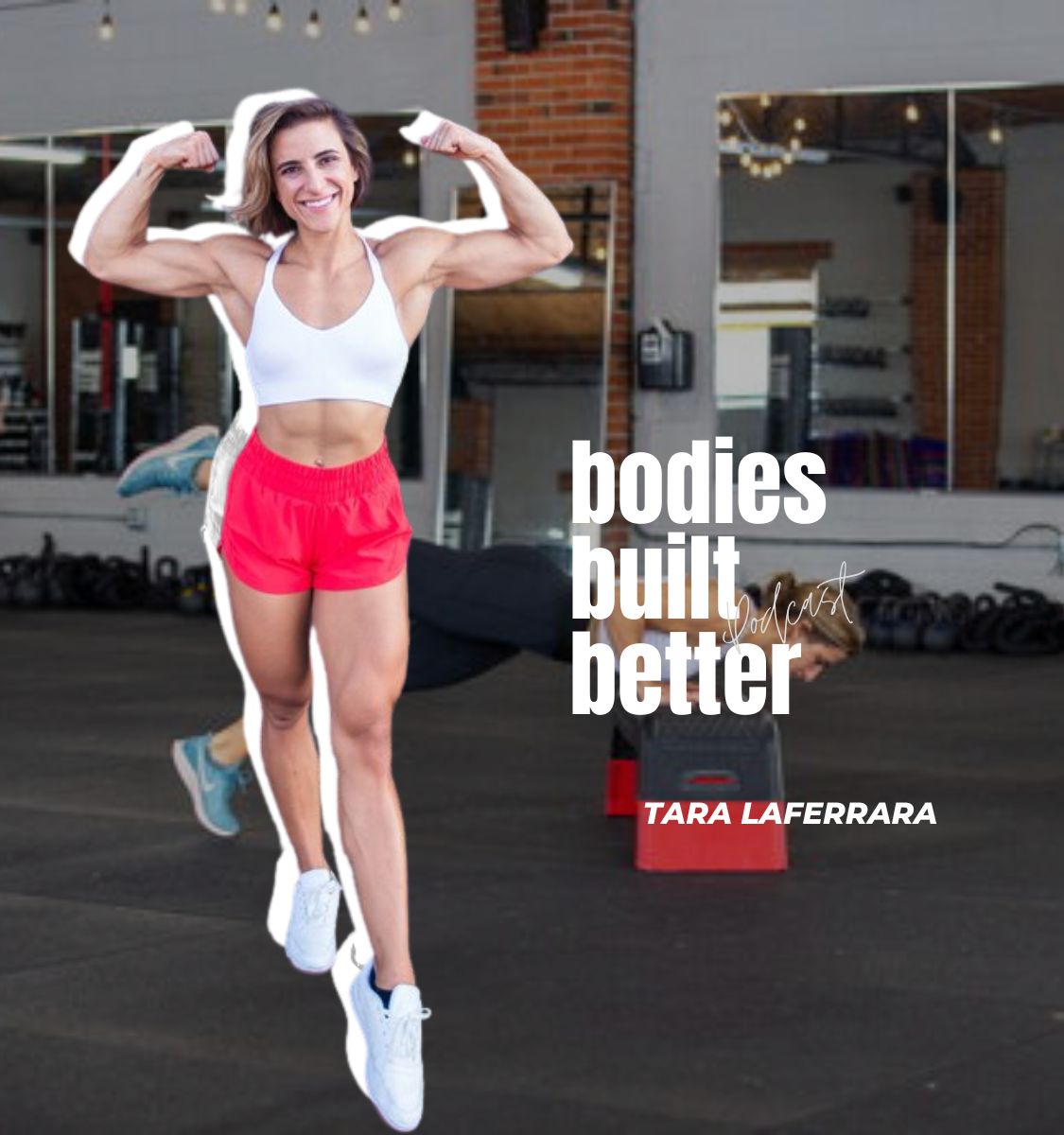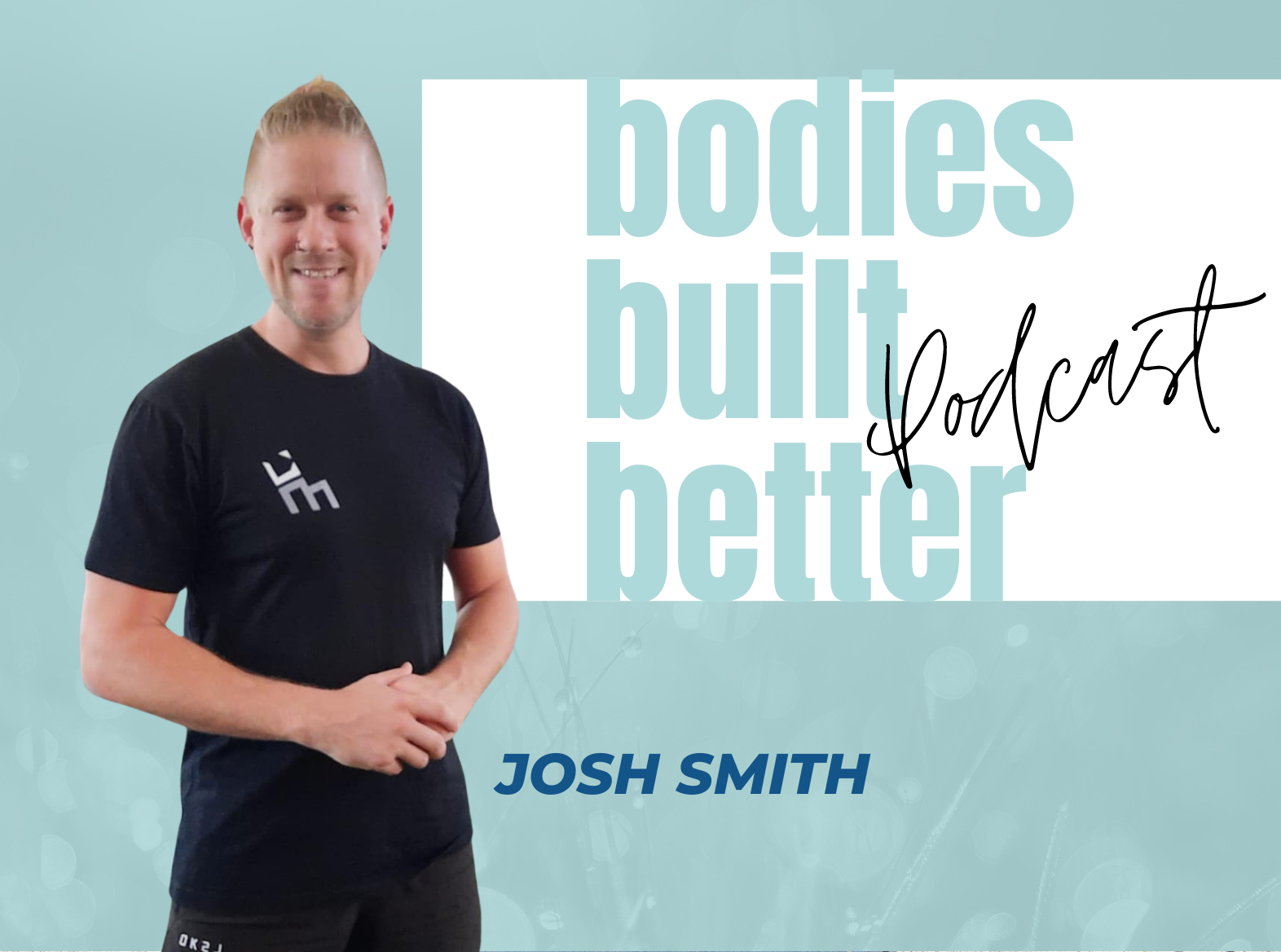How Tara Lost Her Scholarship–And Found Fitness
Jackie 3:32
Tara, thank you so much for chatting with me today. Welcome to the Bodies Built Better podcast.
Tara 3:38
Thank you so much for having me. I’m so excited to be here.
Jackie 3:42
It’s so good to have you. You are a fitness and wellness coach. And I’ve been following you for a long time. And what I love about you is that you just—you’re so good at calling out all the BS that is out there that women are subjected to. I mean, who knew you had armpit fat that you had to lose and has a special exercise for? I mean, how ridiculous, so thank you for calling out this crap. But also the thing that I love is the fact that you know you—whilst being an incredible trainer, you also really advocate for healthy relationships with ourselves and, and, um, and food. And that’s such an important message to be getting out there, especially these days. So thank you for that. I really wanted to start with your journey because I know you are a track athlete in college. How did you go from there and those challenges through that period of your life to where you are now?
Tara 4:49
Yes and thank you for saying that about, um, all the myths out there also just got done eating a doughnut so there’s still the, you know, you can have the doughnut, and workout, and still feel great in your body too
Jackie 5:02
Exactly. That’s right. And who doesn’t want a doughnut?
Tara 5:06
I know, right? And we have this really great doughnut shop and I’m in Austin, Texas. And I tell myself I, like, I would literally go everyday, like, —I’m not a huge doughnut fan, but they just—they always get new flavours and I’m, like, you could only go every, like, other week or so or you’re just gonna, like, go all out.
Jackie 5:22
Exactly.
Tara 5:24
Yeah, it’s crazy. Um, so I went back, in high school and college, um, I’ve been an athlete my whole life. And I was just really fast. And so you kind of go what—with what you’re good at. So, um, I tried out for track my freshman year, went to state, and then ended up winning state in high school, went to college for—got a full ride. And then like, as soon as I got there, it was like this freedom, I had all this freedom, I drink too much, I binge ate, I had this really—got this really bad relationship with myself and my body. I didn’t perform well on the track at all. And I kind of, like, lost sense of who I was. I got injured, I gained weight. My coach basically said, like, “If you don’t lose weight, we have to take away some of your scholarship.” And at that moment, um, my sophomore year of college, I actually just left. I kind of ran away from it. It was a really tough moment of my life of—, you know, when I was 20 years old, I had to leave my full ride scholarship to come—I went back to, uh, Colorado. And that’s where I grew up and, uh, finish out my school, I got a job. And then I just had this, like, huge loss of identity, I was an athlete my entire life. And then it was just kind of taken from me. And, uh, well, I ran away from it. But it was—it was just lifted from me, you know. And so from then on, it was just like this really tough couple of years, of like, getting myself out of this really negative space, um, and I didn’t have a lot of support and positivity around me. I wasn’t in fitness by any means. All I really knew how to do was run fast and turn left. So I didn’t know much else about other things, um, and it took several years of kind of getting out of that too. I ran long distances, I ran marathons, and did a lot of that. But I was not—I didn’t like running, but I just, like, did it because that’s like all I felt like I knew. And then, um, this—a friend of mine was just asking me to go to this workout for a while. And I was, like, “No, I can’t, I can’t do it.” It was just, like, this outdoor workout at a park. And I went one time and I was hooked, like, it was so much fun. It was like a boot camp kind of style. Um, you know, like, uh, kettlebells were out on the field and boxes for like box jumps. And it was just—the camaraderie was so much fun, the community was so amazing. And I was like, “Okay, like, I know, there’s more out there for me.” And I kind of had this, like, weird switch of, like, you know, hanging out with that crowd and, like, being around those people and it just kept going to these classes that turned into a gym. And then I ended up, like, six months later getting my Group X instructor, um, certification group fitness. And then, you know, I had this full time job where I would teach in the mornings, and then go to my work, and then teach in the afternoons and just—for a long time for several years. And then, I actually got laid off from my job and I was, like, I’ve got to make fitness my full time thing. So it’s been about seven years since—six and a half years since then. And, um, I’m now a personal trainer, full online fitness instructor trainer—kind of mindset coach all the things now but, uh, it was—it was a journey to get where I am today but I’m so thankful that I was able to go through that and push past it, so, yeah.
Jackie 8:46
That’s such a really great thing to have pointed out as well when you said, you know, you actually went to this, um, training session and you enjoyed it. Lightbulb moment, yeah, you can enjoy fitness and—and this stuff. Um–
Tara 9:05
Yeah.
Undoing The Toxic Messages From The Fitness Industry
Jackie 9:06
–When you finally got qualified, and you got into this industry, were you already aware, having come from a competitive athlete background, that there were all these toxic messages out there or did it become more prevalent once you got in the industry?
Tara 9:25
Not at all, honestly. Like, I even—I go back to, like, when I first started my Instagram account, which is when I used to run and I would literally just go and post a photo of me, like, going on a run to just get other people to inspire and motivate other people to, like, also read. And then, um, when I finally got into, like, group fitness, instructing and all this stuff. It was probably a couple years before I realized all the things even I was saying, earn those pancakes, do it for the beer afterwards. Um, yoga and Mimosa is like everything is surrounded by, um, earning your food or some sort of, like a reward for it. And there’s just so much that I didn’t even know I was saying or hearing for probably a couple of years before I was like, “Holy crap”, like, there’s so much wrong in the fitness industry. And now I’m, like, I’m just—just try to like, get it out of my vision. It’s not even—I don’t even, like, see it on my feed or any, anything anymore. People actually send me stuff now because I don’t—I’m not a part of it. But you realize how bad it is, when you step out of it. You’re like, “Oh, wow, this is so, like, toxic?”
Jackie 10:36
Hmm.
Tara 10:37
There’s so much there.
Jackie 10:37
Exactly. And I really love…
Tara 10:39
Yeah
Jackie 10:39
…that you said that you’ve pulled back away from that. And I feel like that’s exactly what we all need to be doing is just–
Tara 10:46
Yeah.
Jackie 10:47
–closing off ourselves from all of that terrible messages out there. So…
Tara 10:53
Yeah.
Jackie 10:53
…how did you manage that for yourself? But then also for the people that you were training?
Tara 11:01
Yeah, I mean, it’s a good question. Because for myself at—when I got caught up in it, um, it was –as I was kind of leaving the track world, although it was—it’s been so long since then. Um, it was where the glory days, you know, back in college. I don’t know how old you are. But I’m, like, in my 30–mid 30s now, and I’m, like, “Wow, that was so long ago. Feels so long ago.” That, like social media, wasn’t really a thing.
Jackie 11:25
Yeah.
Relating To The Story Of Vulnerability
Tara 11:25
And so, um, it was, you know, when I first really started getting into training, and was there for a couple years. That’s, for me, it’s like, I’ve always had really big legs and big–a big booty. And I’ve always tried to make them small–smaller, I’ve always tried to, like, fit in with everyone else. And I’m just–genetically, I’m just a more muscular person. And I also like to lift weights, which makes me stronger and more muscular. But that’s always made me–like, media in general has always made me want to fit into this really small box. I was like, always felt like I wanted to feel smaller and less, like, proud and more bold in my space. And so, um, I think getting around other women that did look more like me, or putting, um, myself out there a little bit more so that people can really relate to those things that helped me a lot. And then also, I think with my clients, it’s just they relate to my story or my vulnerability. And of course, it’s not–nothing changes overnight. It takes years and years of mindset changes and shifts. For all the things we’ve been told all of our lives. Um, but it’s a constant work in progress, like, your mind needs reps just as much as the reps you put into the gym.
Jackie 12:44
Yeah, so that’s–that’s hugely important. And, um, I–yes, you’re so relatable. And that was one of the things that I really connected with you first is that you say all the stuff that we’re all thinking? That we don’t say?
Tara 13:02
Yeah.
Jackie 13:03
So it’s nice to–yeah, sort of hadn’t–have that, um, that sort of relationship as well. And knowing that people were–we’re actually all thinking and feeling the same. Um, and that we just need to be moving away from all the–all the shit that we’ve been told to look like, feel like, be like..
Tara 13:27
Yes. Um, a couple of years ago on my Instagram. I don’t know how long you’ve been following me. But every Friday for a long time, I would do this thing called, like, polo palooza. And it would literally just be like, did you fall in?
Jackie 13:38
I love that. Yeah.
Tara 13:40
But every Friday I did this thing where I was just, like, I have cellulite, and stretch marks, and hair on my chin, and my armpits smell weird, I scratch my head. And there’s weird things that, like–all of these things that we think about, and do, and feel. But no one wants to say out loud. And I started that really just because, like, it related to someone. And then every week it was like, I just get these messages like, “Thank you for making me feel less alone.” And it’s, like, yeah, not one of us is alone in anything that we do, or think, or say. But sometimes it just takes someone like me. There’s plenty of other incredible, incredible content creators out there that do this. But, sometimes it takes someone–other person saying it for you to validate or feel okay, about that with yourself.
Jackie 14:28
Exactly. And that’s what I loved about those not only were you calling or, you know, sharing it, but then you’d share all the comments that you got…
Tara 14:37
Jackie 14:37
…And obviously the comments are anonymous. And it was like, “Oh, wow, there are many more…
Tara 14:44
Yeah.
Jackie 14:44
…feeling this, or like this, or do this. And yeah, it was…
Tara 14:49
Yeah.
Jackie 14:50
…it’s–it was a comfort to know.
Tara 14:52
Yeah. And I think most of the time people see these things as flaws and it’s not a flaw. It’s just a part of our body, it’s part of what makes us who we are. And if everyone had the exact same thing, like, how boring would this life be, you know, if everyone didn’t have cellulite, stretch marks, varicose veins, whatever it was. Like, we all look the exact same and no one wants that. it just wouldn’t work that way. So I tried to do that as much as I can, um, and even when I started doing that, I had some friends that are like, “Why are you sharing? This is so weird, like, gross.” And I was like, “Do you think it? Yeah?, okay, well, I’m just saying what you’re thinking out loud.”
Jackie 15:33
Yeah. Oh, wow. Did they eventually kind of go, “Actually, this is really good that you’re doing this.”
Tara 15:21
No…
Jackie 15:42
Or is it just really weird for them?
Tara 15:43
Well, it was–there’s a couple of people that said something and then just never said anything again. But I still saw them watching my stories. I was, like, “You’re enjoying it, aren’t you?”
Jackie 15:51
Exactly. So you can relate?
Tara 15:54
Yeah, exactly. Yeah.
Dealing With The Internal–And External–Aspects of Fitness
Jackie 15:55
Well, let’s talk a little bit more about this and the importance of–I guess, addressing the internal before–maybe not so much before, but we’ve whilst we, you know, are working on the external as well.
Tara 16:13
Yeah. So you mean, just, um, how it–like the way you are perceived? Or?
Jackie 16:20
Yeah, sure. And I’ll let me say that, you know, you on your, um, website, you do group wellness, or health coaching, wellness coaching. And I love the first line of it, you said it’s a group health coaching programme to help you stop being an asshole to yourself, basically.
Tara 16:37
Yeah.
Jackie 16:38
So, you know, with that internal all the stuff that we think about that we, um, you know, that we’re maybe not so happy with, but then we push aside and ignore because we think by working on the outside, how we look is going to fix everything?
Tara 16:57
Yes, okay, that’s great, um, it happens all the time, and actually happened with me for a long time. I was very, more, like aesthetics driven. I wanted to, like I said, fit–be fit a certain mould. Be smaller, like, look a certain way, dress a certain way, because of my peers, or media, or society, or whatever. And it takes so long to reverse what you are told you should be or should like, look like. So, for example, I have a lot of clients, a lot of women in their 40s and 50s that I work with, and that is decades and decades of telling them that they are not good enough that they should eat fat free, or they should be on Atkins diet, or Weight Watchers or whatever, all the things that they should have been doing for decades. I mean, they’re in their 40s, and 50s. And they still are not happy with their bodies. And so when they come to me–of, like, “I want to feel better in my skin and my body.” it’s, like, we’ve got to go small. That is, like, the first thing I always say is, like, you can’t go from I hate my body to I love my body overnight. So I really work with a lot of women on just thought–just thought laddering. So thought coaching of, like, changing it to a more neutral thought like I am–I have a body. I am–I’ve been able bodied, I’m able to move my body, I can do this, I can do this, right? it’s just a more of a neutral thought. And then we gradually make our way to the next step. And I think most times people just want to just flip the switch. And they’re like, “Well, if I changed my exterior looks, I’m immediately going to feel better.” But a lot of times when they change the way they look on the exterior that doesn’t do much for their insides. And so typically, like, when I work with women in that capacity, we actually work just more on the mindset stuff before we even start working out. It’s, like, mindset, walking, water, sleep, the basic, awesome necessities. And then we’re, like, alright, let’s add in a little bit of movement. And now this is going to feel great. But it’s–we’ve got to take these really small steps. And we’re in a society that people want things overnight. They want the quick shipping and they want, like, things in one second, you know, and so it’s way easier said than done. But as I say most of the time, it’s like anything hard. Anything easy is way easier said than done. If it’s hard. It’s not going to be. So it’s, like, anything worth having is, is worth putting in the effort, and putting in the patience, and putting in the reps for.
Working On A Mindset Of Change
Jackie 19:39
Yeah. How do you–how do you help them change that mindset from this is not going to happen overnight, or in a week, or even in a month or two, like, this is–we need to set, you know, long sustainable shifts and lifestyle changes. How does that come and even go?
Tara 19:59
Yeah. It’s tough, but I try to relate it to something that they’re doing. I tried to give as many analogies as possible. Like, um, for a while, I was doing a lot of like exercise cues that would, like, just people really, uh, resonate with when it, like, makes sense in their brain. For example, if it’s like, okay, a deadlift, you want to really engage your lats. Well, how do I do that? Okay, well pretend like there’s oranges in between your armpit and you’re making orange juice out of oranges. You’re like, “Oh, okay. Oh my God, I feel it now. Every time I deadlift I’m gonna think about orange juice.” So for example, something like this, like, small, sustainable, you know, habits over time, I can relate it to their child, if they have one, you know, like, they, they don’t go from coming out of the womb to walking. They don’t just go potty training right away. Or maybe you’re a plant person. It’s like, “Okay, you got this brand new plant, it’s there–the seed. And it’s like, we have to water it. And we have to give it sunshine in order for it to bloom and to grow.” And you want this like, really cool vine in your room? Well, you know how long that takes. Your favorite book? Oh, my gosh, it’s 300 pages long. Are you going to read that in one day? Maybe if you have time, I guess. But usually, it’s like, you’re just really reading 10 pages a day. And, like, that’s how you get closer to finishing that book. You know, it’s just another–I just try and relate it as much as possible to other things that really makes sense in their worlds that they can be like, “Oh, yeah, that does make sense.”
Jackie 21:31
Yeah. I can’t read a 300-page book in one sitting. Oh, that’s alright.
Tara 21:37
Yeah. Oh, no, some people do. Some people love to read. So I was like…
Jackie 21:41
But not in an hour. If we were really relate it back to…
Tara 21:46
Yeah.
Jackie 21:48
…you know, in session…
Tara 21:49
Yeah.
Jackie 21:49
…When you have someone and you have this conversation, and they’re like, “Yep, cool. Let’s do this. But I’m not confident getting into the gym, or I don’t want to go outside and run because I don’t feel confident, or the way I look like, the way I look.” How do you help them? I guess, with that confidence to step out and just do the thing?
Tara 22:18
Yeah, that’s a great question. Because I do get this a lot. Um, I think the first things first is if you said yes, or if you are making your way to starting a programme, or you are like, “I’m in.” Like you have already made a step, you have already taken the leap, you have already stepped one foot out the door. And so if you’re already one step ahead, why not keep going? And it’s–you– like I always say there’s, like, I’m so proud of you for choosing you. And wanting this like that is step number one, like, congratulations, you’re awesome. Let’s do this and take it really slow, right. But that’s the first thing–is I always like to celebrate small accomplishment, small wins. Those means so much more than getting your first pull up. The actual act of getting the pull up is so much more badass than getting over the bar. And people don’t understand, they don’t realize that. But because they want the pull up right away, right, but like the weeks and months that they put into getting this pull up, and then you get it and you’re like, “Oh my god, like, it was all worth it.” Like, those little steps hanging for five seconds to the next time you test, it’s 20 seconds, and you’re like, “Oh, it’s only 20 seconds.” But it’s a 15 second improvement. Like, that’s awesome. So, like,–I like to celebrate those wins. The other thing I really like to say is, like, especially when the confidence thing is, like, wear things, like your clothes matter a lot, wear things that make you feel comfortable, not what anyone else is wearing, because that’s what they’re wearing. And that’s cool and trendy now. So if you want to wear sweatpants and a sweatshirt, or a tank top and shorts, or whatever. It’s like wear the thing that makes you feel the most comfortable so that you can feel confident walking in a gym, walking outside the block. Um, and then the third thing I would say is like, ask for support and some variation of way. Uh, if you have told–let’s say me as your coach, that you are taking the step, you’re ready to take the leap. Like, literally just message me when you’re out on your walk and say, “Hey, like, I’m not on my walk.” I will send you a message back, cheering you on, being proud of you. I’m stoked for you because that’s where you are. Um, if you have a partner, or best friend, or something, call them when you’re on your walk, or call them when you’re on your way to the gym, or you know, text them in that capacity. If you’re in a group programme, take a sweaty selfie beforehand or take a selfie you know as you’re walking in, so that there is that accountability factor but also other people want to support you. So other people want to support you, as always, like, you’re taking that step. People are there for you. And if they’re not, they don’t belong in your circle anymore.
Jackie 25:11
Amen to that.
Tara 25:12
That’s what I think really.
Jackie 25:13
Yeah, absolutely.
Tara 25:15
Yeah.
Why You Should Never Underestimate A Trainer
Jackie 25:15
Um, and I love that I–and I have to I’m the same in the sense that you know, even though I’ve been trained in this, I still get intimidated by the gym and, um, the weights area, and and so I’ve always found that yeah, having–making sure that I do you have that support network, and especially a trainer who trains me, um, has really helped me then transition to you know, getting into the big gyms or, um, not that I do that a lot. But yeah, training in in-groups, and certainly gives you the confidence. So yeah, don’t underestimate a trainer. Gosh.
Tara 25:57
Yeah. Oh, my Gosh. I mean, like, how long have you been in the industry?
Jackie 26:02
Well, since 2015, but you know, [inaudible] has been a part of my life for a lot longer.
Tara 26:10
Yeah. For a long time, right? And I’ve been an athlete all my life, finished running for 10 years. And still, when I go into the gym, and I see all these big bro guys lifting all this weight, and like, the dumbbell rack is just, like, full of bros, I’m like, “Oh, God.” I still feel a little small, like, it’s very–it can be very intimidating. So for someone that’s brand new, like, stick with something that you know, stick with the basics, go find a trainer, find someone that you can work with, get in the corner, whatever makes you feel comfortable, because A, both of us know that we are allowed to be there, like we are allowed to be there, and we belong there just as much as everyone else. But be, like, we’re all doing this for ourselves. It’s like these bros that I’m talking about right now, I’m sure you know who I’m talking about. They only care about themselves anyway. You know, like, no, if you really look around the gym, it’s like they’re looking at themselves in the mirror or at their phone. Like, that’s all they really care about. And so I think, like, having that in the confidence side of, like, am–I can I do this? Do I feel comfortable? Like, yes, you belong there just as much as anyone else. And honestly, no one really cares about you in that space.
Jackie 27:23
Truth. Right there.
Tara 27:26
Yeah.
Jackie 27:27
All of them fooling themselves. You’re right.
Tara 27:31
Yeah. Yeah.
How Goals Shape Progress In Training
Jackie 27:32
So let’s talk about goals for a moment. Because, I mean, how much input do you have on one’s goals? Because you’re able to look at someone and go, I mean, someone you’ve been training for a while, maybe not someone that you’ve just but, um, you know, when they show you their goals, and you can like you’re better than–like, you’re capable of so much more than that. How do you get them to sort of creep out of that comfort zone that they’ve–they’re still comfortably in?
Tara 28:04
Yes, actually, this has happened recently with a client of mine. We–I always do, like, a little movement assessment with my clients, and they’ll send me some videos. I’m like, “Okay, I need these five movements.” And she was doing push ups. And then she did one pushup, and she went straight down to her knees and finished the five reps because I’m like, do five reps of everything. And I looked at that, like, the first push up, Jackie, it was like, perfect. Like, it couldn’t have been like a better push up. And then she went straight down to her knees to finish them. I was like, “Wait, what is going on here? What’s the deal?” And I messaged her, I was like, “Hey, like, the first push up looks so good, like, what’s going on?” And she was like, “I just, like, don’t trust myself, and I don’t want to get hurt.” And I’m like,“ All right. Like, we have to do a whole like thing where–I am like, first of all, yes, you can.” And I know that me saying that is like, “Oh, yeah, cool. You have to believe it yourself.” But take another really, like, go right now take another video and do the push ups on your feet. And sure enough, she did five full push ups on her feet. And I was like, “Okay, take that mindset and put it into your workouts now, like, you know that you can do that. Now we have a baseline, let’s improve from there.” And I think it’s–a lot of women specifically are afraid of getting hurt, especially with weights, when they’re putting you know, back squats, or deadlifts, or something like that. They’re afraid that they’re not doing it correctly, or that someone else is going to, you know, come in and help with their form. They are afraid of, um, still, unfortunately, which I’m sure we’ll talk about getting too muscular, because that’s going to happen in one deadlift. Um, they’re afraid of a lot of different things. And so, getting over that barrier is tough, but it comes from a lot of just, like, work internally of–like, “Can I do it? Okay, I did it. Let’s keep progressing.” And even if it’s slow, I don’t–like,I don’t, like, if someone comes to me and, like, I want to do five push jumps, but you already did five push ups, I’d be like, “Okay, cool. Let’s just move to 10.” Or let’s just like–I only give them, like, a little bit. Just so well–depends on the person, but just so that they can be like, “Okay, I did that.” Okay, like some people like smaller goals, and some people like these, like, bigger things, so kind of just depends on who they are.
Where To Find Tara
Instagram: @taralaferrara
Website: www.taralaferrara.com
Training: www.taralaferrara.com/tl-method
YouTube: https://www.youtube.com/taralaferrara
In the mood for more inspiring conversations? Check out our past episodes of the Bodies Built Better podcast!







